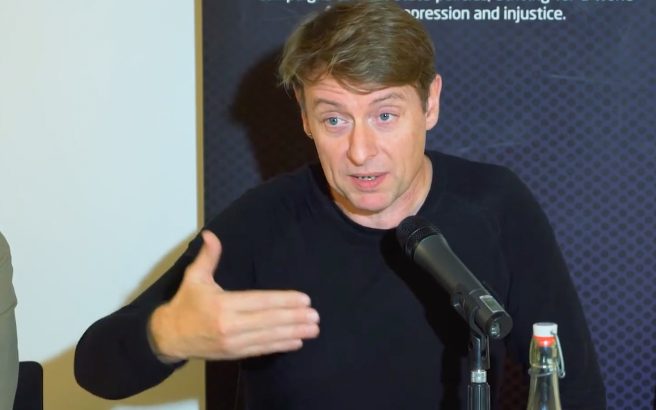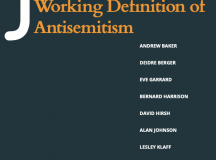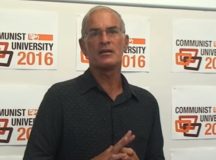According to Bristol University Professor David Miller, ‘Britain is in the grip of an assault on its public sphere by the state of Israel and its advocates’. He believes ‘Bristol’s JSoc [Jewish Society. Ed], like all JSocs, operates under the auspices of the Union of Jewish Students (UJS), an Israel lobby group’ and is part of ‘a campaign of censorship and manufactured hysteria’ that is ‘directed by the State of Israel’. The campaign involves false claims of antisemitism designed ‘to give cover to Zionist activists’. His outburst has led to outraged calls for his removal but also fulsome messages of support from the academic left, in the form of open letters that do not simply argue Miller has free speech rights but which endorse his world view. David Hirsh, author of Contemporary Left Antisemitism, explores the wider meanings and deeper roots of the controversy.
Introduction: David Miller’s Amazing World of Zionist Chicken Soup
‘Of course Israel have sent people in to target that, to deal with that. Particularly through interfaith work … pretending Jews and Muslims working together will be an apolitical way of countering racism. No, it’s a Trojan horse for normalising Zionism in the Muslim community. We saw it in East London Mosque for example, where East London Mosque unknowingly held this project of making chicken soup with Jewish and Muslim communities coming together. This is an Israel-backed project for normalising Zionism in the Muslim communities…’ Professor David Miller, speaking to the Labour Left Alliance, June 2020.
A left wing Professor of Sociology, David Miller warns Muslims that chicken soup is really a Zionist weapon. It is served up by people who pretend to nurture interfaith friendship but whose real motive is to anaesthetise Muslims to the danger of a global Israeli campaign to sow Islamophobia and racism. Miller says his own Jewish students, if they identify with Israel in any sense, are to be treated as ‘Zionist’ in his sense, which then makes them, in Miller’s story, part of the what he has described as an “enemy” to be “targeted”. But he remains a Professor at Bristol University and many academics jump to his defence, insisting that he is guilty of nothing more than presenting and evidencing legitimate ‘criticism of Zionism’. How did British academia get here? In this long-read I try to explain, as straightforwardly as possible, the meaning of David Miller and what made him possible.
-
David Miller vs. the Macpherson Principle
It is often claimed that Jews have trouble telling the difference between criticism of Israel and antisemitism and that they are prone to feel it all as antisemitism. At first sight this claim feels plausible. Perhaps Jews tend to be so on edge because of their family and communal experiences of antisemitism that they may be a bit prone to seeing it when it is not really there. Yet this scepticism is already a radical departure from how we generally judge, for example, women when they say they have experienced sexual harassment, or black people when they say they have experienced racism.
The High Court Judge who chaired the Stephen Lawrence Inquiry, Sir William Macpherson, sadly died last month. He made two significant contributions to the general acceptance of good practice about racism. First, he cemented the concept of ‘institutional racism’ into the British mainstream. Racism should not only be recognised as the conscious hatred of those who are designated as being of another ‘race’. We should also look out for ways of doing things and ways of thinking which may seem innocent but which turn out to be contaminated by racism in ways that are not apparent. Racism is part of a larger social phenomenon and is not just an individual moral failing.
His second significant contribution was the Macpherson Principle, which asserts that when a person says they have experienced racism, this should be taken in good faith as an honest report of what they have experienced. Any investigation should begin with this assumption and should proceed to look at the evidence objectively.
There is a common principle, derived from identity politics, that the people best qualified to judge when there has been racism, sexism, or homophobia, are the victims of those aggressions themselves. It is not common to question their judgment on the basis that because they have experienced so much bigotry in the past, their clarity is now so blunted as to be generally suspect.
But still, perhaps some Jews, sometimes, see antisemitism in legitimate criticism of Israel. When this happens it can be addressed by a rational discussion of the case, of the evidence, of the intention, of the context, and of the audience’s perception. If we agree that some kinds of criticism of Israel are antisemitic while other kinds are not, then we can discuss and agree, or perhaps disagree. That is how freedom of speech and academic freedom work.
But that is not Professor David Miller’s position.
He says that ‘Britain is in the grip of an assault on its public sphere by the state of Israel and its advocates.’ He says that ‘Israel’s lobby is busily stealing the language of Black liberation to justify ethnic cleansing, racism and apartheid.’ (As though Jews do not have their own authentic language to describe the racism they have faced and the liberation for which they yearn.) Miller says that ‘Israel and its apologists’ employ ‘the time-honoured tactic of smearing any critic of Israel or Zionism as an “anti-Semite”.’[i]
David Miller’s description of how the world works is a fantasy of Zionist conspiracy. In form it is similar to more explicitly anti-Jewish antisemitism. And when he talks about Israel’s ‘time-honoured tactic’, and in another article about an ‘age-old Israel lobby tactic’[ii] he inadvertently slips into a way of thinking that is much older than antizionism.
David Miller is not articulating a worry that Jews may be over-sensitive about antisemitism or about criticism of Israel. His position is that Jews who allege that there is antisemitism on the left, or on campus, are acting as part of a deliberate and collective conspiracy to lie. ‘The purpose of all this’, (note ‘all this’ not ‘some of this’ or even ‘most of this’) adds Miller, ‘is to give cover to Zionist activists, allowing them to present themselves as part of a benighted ethnic minority facing racism.’[iii]
Much may be said about the significance of substituting the word ‘Zionist’ for the word ‘Jew’ in the structure of conspiracy fantasy. But Miller’s practice is to interpret the mere act of saying that one has experienced or witnessed antisemitism as sufficient evidence to define the person so acting as a member of the Zionist conspiracy. It follows, therefore, for Miller, that people who raise this kind of antisemitism as an issue are necessarily doing it in bad faith. And those people are frequently Jewish.
Antizionism claims that its hostility cannot be antisemitic because it is equally hostile to non-Jews. ‘Many Zionists are not Jewish,’ it says, ‘so how can antizionism be antisemitic’? But this does not succeed in setting up a non-antisemitic framework for hostility to Israel; rather, it succeeds in setting up an antisemitic framework into which it ropes non-Jews. Many non-Jewish allies have been relentlessly subjected to the antisemitic thinking and practice of people like David Miller.
It should be noted that over the last five years, through the experience of the rise and fall of Jeremy Corbyn’s leadership of the Labour Party, there has been a strong consensus in the Jewish community, and in the institutions of the Jewish community. There is wide agreement that left wing antisemitism is real and significant. Miller’s method, therefore, designates the Jewish community, not just this or that individual, as being part of ‘Israel and its apologists’[iv].
So, the Macpherson Principle tells us that a person who says they have experienced racism should be treated with respect and their experience should be taken seriously.
But the Miller Principle would seem to tell us that a person who says they have experienced antisemitism, if it is related to rhetoric about Israel, should be assumed to be lying.
This practice of treating Jewish victims of antisemitism as part of a conspiracy to silence criticism of Israel, is well documented. It is named ‘The Livingstone Formulation’.[v] It is worth mentioning that rhetoric resembling the Livingstone Formulation long pre-dates antizionist antisemitism. This, for example, from Heinrich von Treitschke’s The Jews are our misfortune, published in Germany in 1879:
Anyone is permitted to say unabashedly the harshest things about the national shortcomings of the Germans, the French, and all the other peoples, but any who dared to speak about the undeniable weaknesses of the Jewish character, no matter how moderately or justly, was immediately branded by almost the entire press as a barbarian and a religious bigot.[vi]
Wilhelm Marr himself, the inventor of the word ‘antisemitism’, prefaced his own pamphlet with the expectation that Jews would silence his ‘criticism’ with an concocted allegation of bigotry:
I wish two things for this pamphlet. 1.) That Jewish critics will not hush it up, 2.) that it will not be disposed of with the usual, smug commentary.[vii]
Moreover, both of these writers made it clear – just as contemporary antisemitism does – that the vulgar Jew-hatred that came before them was quite unfair. It is only in our own age, they said, that the Jews have actually begun to behave in the way that the Jew-haters of old wrongly said they behaved.[viii]
The EHRC Restates the Macpherson Principle for Jews
In 2020 the Equalities and Human Rights Commission (EHRC) specifically re-stated the Macpherson Principle for Jews who say they have experienced antisemitism. The reason the EHRC felt the need to do this was that it had observed the routine violation of the principle in the Labour Party during the period in which it was polluted by institutional antisemitism.
The EHRC described the following under the heading ‘types of antisemitic conduct that amounted to unlawful harassment’:
Labour Party agents denied antisemitism in the Party and made comments dismissing complaints as ‘smears’ and ‘fake’. This conduct may target Jewish members as deliberately making up antisemitism complaints to undermine the Labour Party, and ignores legitimate and genuine complaints of antisemitism in the party.[ix]
That is, if you like, ‘the EHRC Principle’. And that is why David Miller needs to portray the EHRC itself as a victim of the Israeli assault on Britain. He has to say that the UK’s statutory body has been successfully and completely corrupted by the Zionist conspiracy. Miller writes that:
Meaningful conversations about anti-Black racism and Islamophobia have been drowned out by a concerted lobbying campaign targeting universities, political parties, the equalities regulator and public institutions all over the country.[x]
-
David Miller vs. Sociology
The antisemite takes pains to speak to us of secret Jewish organisations, of formidable and clandestine freemasonries. – Jean Paul Sartre[xi]
David Miller includes his own Jewish students, anyway those who participate in their Jewish Society or UJS, as part of the Zionist project to prevent anti-Black racism and Islamophobia from being taken seriously, and to subvert UK public institutions on behalf of Israel.
He does this by demonstrating that Jewish Societies include ‘engagement with Israel’ as one of their ‘core values’.[xii]
A key principle of the sociological understanding of ‘race’ is that race is constructed, in the first place by racism. People are certainly free to construct diverse and empowering ways of feeling and living their own identities. But racism constructs people’s identities from outside, without their consent, and in hostile ways. A person who is very comfortable being black may feel less comfortable if they are defined as black by a white gang in the street or by an antagonistic employer. That is what racism does.
What David Miller is doing here is defining members of UJS and the Bristol J Soc – that is to say his own students – as ‘Zionist’, by which he means racist, imperialist and dishonest. He has imposed the identity onto them without their consent. They may or may not define themselves as ‘Zionist’, and each may have a unique different understanding of the meaning of the Zionism that they themselves embrace. The Zionism of UJS and of J Socs has nothing in common with the demonising identity that Miller thrusts upon them. In truth, for the overwhelming majority of Jews, some kind of relationship to Israel, where half of the world’s Jews live, is a part of their Jewish identity. But that does not make them racists or unpatriotic to their country, or to whatever other identity Miller thinks they should be loyal.
David Miller’s work is reminiscent of the writing of the classic antisemite who sets himself up as an expert on ‘the Jews’. Miller warns Muslims at the East London Mosque to beware of Jews doing ostensibly innocent interfaith work with them. He constructs intricate diagrams which illustrate in copious detail the connections, which he claims his work uncovers, between Jewish individuals and institutions which he designates as ‘Zionist’. He portrays his work as shining a light into the hidden dark world of the racist and murderous conspiracy.
But sociology is fundamentally an empirical discipline. It starts with a rigorous and structured investigation of the world. Only then does it move on to create concepts and theories which may help to understand and make sense of what has been observed. Conspiracy fantasy works the other way round. It starts with the sense that is to be made, and then it proceeds to find the invented and fantastical patterns in the external world.
This is an account by a student at Bristol of how David Miller teaches sociology:
I was one of the only Jewish students in David Miller’s class. Honestly it was scary because he is a teacher so people believed the anti-Semitism he was spreading. I was scared because I am one voice and felt I couldn’t stand up to him or tell him what he was saying was wrong.
In Miller’s ‘Harms of the Powerful’ module he claimed the ‘Zionist movement (parts of)’ were pillars of islamophobia. He also attempted to link various British Jewish organisations to the state of Israel. As a Jewish student, this conspiratorial spider’s web of arrows and organisations was grimly reminiscent of antisemitic tropes where Jews are accused of having unique power and influence over political affairs.[xiii]
After Sabrina Miller, another Jewish student at Bristol, had published this account, ‘Electronic Intifada’, the same website which published David Miller’s piece quoted above, posted pictures of her. In what could easily be interpreted as incitement, it called her a representative of the ‘Israel lobby’ and denounced her as part of the Zionist movement which seeks to punish David Miller.[xiv]
The Jewish Chaplain at Bristol University wrote a letter to the Vice Chancellor:
One Israeli student has told me that he receives daily abuse on the count of his country of origin, and this is utterly unacceptable. It is clear from Miller’s recordings and open statements that he has nothing but contempt for Jewish students and is consciously perpetuating conspiratorial myths about the Jewish state and its power. To read his words is reminiscent of the worst antisemitic propaganda – Jewish students in Bristol are being attacked as fifth columnists….[xv]
Conspiracy fantasy is necessarily unfalsifiable. Both the student and the Jewish Chaplain can be defined, because they say there is antisemitism, as lying lobbyists for Israel. The testimony of their experience is itself silenced, by means of an accusation that it is a cynical attempt to silence. And the individuals are made legitimate targets by defining them as racist supporters of racist Israel.
Sociology itself was invented in the 19th century to offer a scientific account of structures of power in our society. The founders of sociology, a number of whom were Jewish, were aware that one reason why this was so important was because of the attraction of conspiracy fantasy, and specifically antisemitism, as a way of understanding the world.[xvi] In my opinion David Miller does not study sociology in a way which is in any sense scientific or related to any kind of legitimate methodological framework.
Rather, Miller’s work constructs what sociologist Keith Kahn-Harris describes as a kind of ‘flatland’, a world in which networks of power and influence are so intricately connected that they form a seamless system.
Take Miller’s well known slide from his presentation on how British Jewish/Zionist/Israel lobby institutions are interconnected … While the nodes on this network are differentiated by type (‘Israel institution’, ‘Key UK individuals’ etc) and while the nature of the interconnections are identified (‘donor’, ‘president’ etc), these annotations do not in fact tell us anything meaningful, because there isn’t any meaningful distinction to be made – and that’s the point. That, for example, [two named individuals] Mick Davis and Vivian Wineman have been fiercely criticised from the right of the Jewish community for their dovish views on Israel is of no import. That the Board of Deputies and the Zionist Federation are coalitions constantly riven by tension and dispute is not worth remarking on. Zionism/Israel forms a seamless whole.[xvii]
The sociologists in Miller’s department at Bristol and the discipline more widely must bear some responsibility for their colleague. Miller’s antisemitic discourse is not that unusual on campus but it sticks out because he likes to say clearly and explicitly the things that other academics prefer to say in more opaque and ambivalent language. Miller resembles Ken Livingstone in this regard. Livingstone was no worse than Corbyn himself, but he enjoyed articulating the logic of their shared antisemitic worldview more clearly.
Miller has been given a Chair, the highest position of respect and responsibility in academia; he is a tenured Professor. To be promoted to that status requires the explicit endorsement of a significant number of Professors, inside and outside of both his department and his discipline. If Sociology is incapable of recognising antisemitic conspiracy fantasy as being outside of its own boundaries, then what does that tell us about the state of Sociology today?
I myself have a significant loyalty to Sociology. The sociology that I was taught by Robert Fine and others is keenly aware of the dangers of racist and totalitarian thought. It is also alive to the ways in which human beings exclude each other in hidden, complex, unconscious and unspoken ways and it is vigilant in identifying structures of power that may not be easy to observe. I think that the methods and intellectual frameworks of Sociology have been important to my own work on antisemitism. I spend quite a lot of my working life socialising new students into the discipline and introducing them to some of its very basic ways of thinking. But the fact that David Miller has tenure tells us something about his peers as well as something about himself. It should be part of the very core business of sociology to recognise antisemitism and racism.
Conspiracism and Anti-Democratic Thinking
Miller is not just that a random and eccentric individual, he is part of a wider culture on parts of the left and parts of academia. Antisemitism and conspiracy fantasy are forms of appearance of anti-democratic thinking. Some Muslims who have been organising politically against Islamist extremism and terrorism say they have been targeted by Miller as ‘neocon’ and as pro-imperialist, and thence as part of the global Zionist conspiracy.
And Syrian refugees have also been targeted by Miller as dupes of imperialism because they opposed the Assad regime. According to the Syrian refugee, journalist and campaigner Oz Katerji, Miller has been part of campaigns to support Assad, and his Russian and Iranian backers. They have demonised the genuinely heroic ‘White Helmets’ as al-Qaeda affiliates.[xviii] According to The Times David Miller has ‘provided academic status to a group led by proponents of conspiracy theories’. The Times examined the ‘Organisation for Propaganda Studies’ and conspiracy fantasies relating to ‘the September 11 terrorist attacks, the shooting down of an airliner over Ukraine in 2014, the White Helmets humanitarian rescue group in Syria, the antivax movement and the origins of the coronavirus.’[xix]
-
David Miller vs. the IHRA Definition of Antisemitism
There is increasing pressure on Bristol University to fire David Miller. Daniel Finkelstein[xx] made the case for Miller’s dismissal in The Times, the Board of Deputies of British Jews has called for the ending of Miller’s tenure[xxi] and UJS has raised the slogan ‘Get Hate off Campus’.[xxii] The most compelling grounds for dismissal are related to his speech about his own Jewish students. If they judge that his work is antisemitic, then he thereby designates them as agents of Israel.
On the other hand there is significant support for Miller from people who think he is a victim of a Zionist witch hunt, for example Professor Des Freedman, who designates Miller’s work as ‘criticism of Zionism’[xxiii] and Professor Jeffrey Bowers, who asserts that Miller is falsely accused of antisemitism.[xxiv] While many of Millers’ allies mobilise the rhetoric of academic freedom and freedom of speech, it is not clear how many of them do so with respect to colleagues who present other kinds of racism or bigotry as academic scholarship.
And then there are many, like Frank Furedi, who fully recognise Miller’s work as antisemitic, but who argue for a very strong free speech and academic freedom position whereby even antisemitic Professors should be protected.[xxv]
It may be added, however, that this absolutist free speech position puts heavy demands on Jewish students and Jewish scholars. Mirada Fricker[xxvi] has written about what she calls ‘epistemic injustice’ and Nora Berenstain has written about ‘epistemic exploitation’:
Epistemic exploitation occurs when privileged persons compel marginalized persons to educate them about the nature of their oppression. I argue that epistemic exploitation is marked by unrecognized, uncompensated, emotionally taxing, coerced epistemic labor. The coercive and exploitative aspects of the phenomenon are exemplified by the unpaid nature of the educational labor and its associated opportunity costs, the double bind that marginalized persons must navigate when faced with the demand to educate, and the need for additional labor created by the default skepticism of the privileged. [xxvii]
It follow that a university which judges David Miller’s freedom of speech to be a priority, also has a responsibility to employ genuine scholars of antisemitism and to fund scholarly journals about antisemitism, in order to counter his conspiracy fantasy.
In the background of this discussion are Government suggestions that it might intervene to protect free speech on campus. Perhaps they have free speech for conservatives and for Brexiters in mind; perhaps they are also considering moves to protect those who are designated as ‘Trans Exclusionary Radical Feminists’ and those who are designated as ‘Zionist’ from being prevented from speaking or publishing.
Beyond these shores, the populist Government in Poland is enforcing new ‘laws’ against scholars of the Holocaust which stop them from saying things which are true but which some Polish nationalists find offensive.[xxviii] And the populist Government in Hungary has driven the Central European University out of the country, accusing it of being financed by George Soros on behalf of the globalist, liberal, finance capital elite.[xxix]
The antizionist case against the IHRA working definition of antisemitism is also generally founded on free speech and academic freedom rhetoric. Lars Fischer, a leading scholar of antisemitism has articulated the problem as follows:
In the controversy surrounding the IHRA definition of antisemitism there is only one issue of free speech and only one party trying to curtail it. The antisemites want to engage in antisemitic activity without their opponents being allowed to call that activity antisemitic.[xxx]
I have written at length in Fathom about the genealogy of the IHRA definition[xxxi] and I have responded at length to a recent antizionist petition against the IHRA definition.[xxxii]
‘No platform’ was a policy which emerged in the UK in the 1970s to be used against organised racists and fascists who constituted an immediate physical threat on campus. Since then the definition of who should be ‘no platformed’ has widened considerably in some quarters to mean somebody who argues for a position which may be interpreted by opponents, as racist, sexist, transphobic, homophobic, Islamophobic, etc. It has widened into what some commentators are ridiculing as ‘cancel culture’, in which anybody who strays from an orthodox consensus on campus may be prohibited from speaking.
I have a rational fear of being banned because ‘Zionist therefore racist’. Yet we should not allow every allegation of bigotry to be equal to every other. We need to make distinctions. Some things are actually racist and some are actually not. But therein lies the problem. There is little consensus across campus or across society about what is, and what is not equivalent to racism.
Absolute free speech rights in the ‘public domain’ are distinct from what constitutes appropriate speech within a community of scholars, a university. An academic does not have the free speech right, or the academic freedom right, to put pornographic pictures up on the notice boards in their university, for example. It would create a toxic environment for women, irrespective of the possibility that there might be some women who would defend it, ‘as a woman’, and say that they did not feel at all threatened. You cannot have a workplace or a study place, a community of scholars, in which people claim the right to violate the Equality Act for some greater principle. The EHRC, in its report into Labour Antisemitism, offered clear guidelines about what constitutes antisemitic harassment in an institution.
-
How the UCU prepared the ground for David Miller
It is impossible to understand a David Miller, or the support he has received from other academics, without knowing a little about how Israel, antisemitism and BDS have been debated in the recent history of the lecturers trade union, the UCU.
I have never been in a more hostile and antisemitic space than my union. In the UCU I have been transformed from a loyal member and a fellow scholar into a ‘Zionist’. Just as David Miller thrusts ‘Zionism’, meaning racism, onto his students, this identity has been thrust upon me from outside, in a hostile way, and against my consent, in my union.
Back in 2003, the campaign to boycott our Israeli academic colleagues began to take root in the forerunner of the UCU. The boycott campaign sought to create within our union such a focused anger against Israelis, and only Israelis, that union members would feel ready to single them out and punish them for the crimes, real and imagined, of their state. The crimes of our own state, and those of other states, were sometimes criticised, but nobody proposed to hold the scholars accountable for them simply by virtue of the country in which they work. It did not matter that Israeli academics had been at the forefront of the peace movement nor that the universities in Israel were amongst the most egalitarian spaces there. The boycott campaign designated all Israelis as ‘collaborators’ with the very worst things done by any Israelis.
You would think that such a campaign would worry about its attractiveness to antisemitism but this campaign angrily denied even that possibility. The boycotters turned fiercely against their critics within the union. They demonised them as enemies of the Palestinians and then enemies of the principle of solidarity, and so they portrayed their opponents as people who were fundamentally disloyal to the union and its culture. Many of the people within the union who were othered in this way, although significantly by no means all of them, were Jewish.
In 2005, after the union had resolved to boycott academics from specific Israeli universities, we organised and inspired a fight back. We armed opponents of the boycott with information and with arguments. We said that solidarity with Palestinians rather than boycotts of Israelis was the right strategy. We publicised the voices of colleagues who were teaching in Palestinian universities and who opposed boycotting. We highlighted the work of Israeli and other colleagues who were involved in joint academic projects and teaching with colleagues in Palestinian universities. We hoped to do, from the outside, what we could to facilitate solidarity between Israelis and Palestinians, and to support a politics of peace. We opposed the flag waving posturing which designated one nation to be good and the other bad. We called a huge, special one day council meeting and we won the day. Our union reversed its position, it disavowed the politics of boycotting Israelis and it resolved to formulate a consistent policy relating to human rights abuses in other countries.
But the boycotters did not accept their defeat in the union. They came back year after year pushing their focused Israel-hatred and spinning a one sided narrative about the Israel-Palestine conflict. They targeted people within the union and on our campuses in Britain who they regarded as being defenders of Israel. Israel was made symbolic of the whole global evil of capitalism and imperialism. They targeted those Jews who refused to disavow Israel and they isolated those who remained quiet.
The campaign to boycott Israel was wrong in itself for a number of reasons, including its violation of the very meaning of the university, as a global community of scholars. But it was also forged within an authentically left wing tradition of antisemitic thinking and it normalised, licensed and propagated antisemitism into the future.
In a union of 120,000 people who work in universities there are quite a few Jewish members. But by 2009 there were no Jews left in the national decision making structures of the union who were willing or able to oppose the boycott campaign and the antisemitism which fuelled it, and which was in turn, fuelled by it.
There were some antizionist Jews who played an important role in mis-educating people. They taught members to recognise claims of antisemitism, rather than antisemitism itself, as the real threat to the left and to the principles of trade unionism.
The union never actually adopted the boycott. It was afraid of the damage that it would do, it was afraid of legal action, and it knew that such a policy could not be enacted in any way which could even appear coherent. We take that as a victory.
But in the campaign against antisemitism, we were defeated. By 2009, nearly everyone I fought alongside in the union against the boycott campaign and its associated antisemitism, had gone. Many had resigned from the union in protest, many had been bullied out, many had been silenced. Many were just tired and were not prepared to devote their whole energy, for ever, to fighting the stubborn Israel-obsessives in the union.
I was bureaucratically excluded from the internal union email ‘activist list’ because I published some of the antisemitism I witnessed there. Where there is institutional racism, boundaries between ‘inside’ and ‘outside’ are always heavily policed because what passes as normal inside is easily recognised as not normal in the ordinary world. The union leadership protected the space within which antisemitism was allowed as ‘free speech’ and ‘criticism of Israel’. A number of anti-boycotters were excluded from the list but nobody was ever excluded from it explicitly because of antisemitism. I am still, fifteen years later, excluded. You get a shorter sentence for murder.
We were told by union colleagues that we opposed the boycott because we thought we were the ‘chosen people’ and that was why we were racist; we were told our racism originated in the Torah and the Talmud. We were told we were like the Nazis at Theresenstadt, whitewashing Israel’s evil; our gay colleagues were told they were ‘pinkwashing’ Israel’s evil. We were told that we only pretended to experience antisemitism as a trick to silence criticism of Israel; we were told that we were apologists for apartheid; we were told that we only pretended to support self-determination for the Palestinians; we were told that we received orders from the Israeli embassy. On and on it went. Some of our very smart and courageous non-Jewish comrades and friends fought bravely alongside us. But I saw people close to me being pushed out, turning to drink, cigarettes and drugs, having breakdowns, losing lifelong friends and being excluded from the community of scholars. This all happened in the University and College Union and in the culture it brought into our university departments.
We failed to defeat antisemitism in UCU and, as we had feared it would, the antisemitism spread into the trade union movement and then into the Labour Party. The story of how it coalesced into the Corbyn movement and came close to 10 Downing Street is now well understood. It has been told in my book and those of Dave Rich and Matt Bolton & Harry Pitts; it has been told in the journalism of Gabriel Pogrund and John Ware; it has been told in the testimonies of the victims who were excluded and demonised by Labour antisemitism; not least the women, Luciana Berger, Margaret Hodge, Ruth Smeeth, Joan Ryan and Louise Ellman, who suffered waves of specifically misogynist and sexually violent antisemitic rhetoric.
And, as already mentioned, the story has been told by the EHRC, the statutory body set up by the last Labour Government to defend the principles of the Equality Act. The EHRC focused specifically on the way in which the culture in the Party had othered opponents of antisemitism by accusing them of being involved in a dishonest conspiracy to ‘smear’, to ‘fake’. Opponents of antisemitism were accused of ‘weaponising’ antisemitism against the left, as though antisemitism itself was not already in essence a weapon forged to hurt Jews. EHRC also said that antisemitism took hold in the institutions and the culture of the Party, that it was not only the antisemitic politics and the hatred that were important, but also the roles played by ordinary loyal members and officials.
Now that antisemitic politics is being driven out of the Labour Party, it is looking to re-group back in its safe space, on campus and in the UCU. Some of the defeated rump of British left wing antisemitism is trying to disavow the most explicit Jew-hate that it picked up when it went mainstream, and to purify itself again in an academic and respectable discourse of ‘criticism of Israel’. If that is the case, the urge to be loyal to David Miller gives it a dilemma.
UCU has never had to face up to what it became or what it did. It incubated and normalised a culture which corrupted the Labour Party to such an extent that it could constitute no electoral threat even to somebody as politically unattractive as Boris Johnson. Ordinary working class people in Britain sniffed the UCU’s antisemitism, as manifested in Corbyn’s Labour Party, and they were repelled by it.
But the clever people, the cultured people, the lecturers, the creators of right and good opinion in new generations of journalists, teachers, politicians and the chattering classes, have not been held to account. They are carrying right on. And they’re giving an intellectual gloss to the story that between ‘us’ and ‘socialism’ stood ‘Zionism’, which appeared as the institutions and members of the Jewish community.
The danger is that this will inspire a new ‘stab in the back myth’ to explain the defeat of the Corbyn movement. ‘We were never even allowed to fight for socialism,’ that myth says, ‘because we were stabbed in the back by people within our own movement who pretended to be part of us but who were really part of a global, imperial, elite, conspiracy to defend capitalism and Zionism.’
Labour antisemitism is defeated for the moment, but the culture and the common sense notions it was built out of preceded it, and will outlast it. It was incubated, in part, in academia and the University and College Union, and now it is returning there, looking for a safe place where it can nurture and renew itself. That is the meaning of David Miller.
References
[i] Miller, D. (2021). ‘We must resist Israel’s war on British universities’. [online] The Electronic Intifada. Available at: https://electronicintifada.net/content/we-must-resist-israels-war-british-universities/32391 [Accessed 23 Feb. 2021].
[ii] Mendel, J. (2021). ‘Pressure mounts on Bristol Uni over academic accused of “antisemitic tropes.”’ [online] Timesofisrael.com. Available at: https://jewishnews.timesofisrael.com/pressure-mounts-on-bristol-uni-over-academic-accused-of-antisemitic-tropes [Accessed 23 Feb. 2021].
[iii] Miller (2021)
[iv] Miller (2021)
[v] Hirsh, D. (2016). ‘The Livingstone Formulation – David Hirsh’. [online] Engage. Available at: https://engageonline.wordpress.com/2016/04/29/the-livingstone-formulation-david-hirsh-2/ [Accessed 23 Feb. 2021].
[vi] von Treitschke, H. (2021). The Jews are our Misfortune, quoted in GHDI – Document. [online] Ghi-dc.org. Available at: http://ghdi.ghi-dc.org/sub_document.cfm?document_id=1799 [Accessed 24 Feb. 2021].
[vii] Wilhelm Marr quoted in Jacobs, S., 2020. Antisemitism: Exploring the Issues. Santa Barbara: ABC-CLIO, p.85.
[viii] For more on this theme see David Seymour (2019). ‘Disavowal. Distinction and Repetition: Alain Badiou and the Radical Tradition of Antisemitism. In: Campbell, J. G. and Klaff, L. D. (Eds.), Unity and Diversity in Contemporary Antisemitism: The Bristol-Sheffield Colloquium on Contemporary Antisemitism. (pp. 203-218). Boston: Academic Studies Press.
[ix] Investigation into antisemitism in the Labour Party – Report. (2020). [online] . Available at: https://www.equalityhumanrights.com/sites/default/files/investigation-into-antisemitism-in-the-labour-party.pdf. p. 28.
[x] Miller (2021)
[xi] Sartre, J., 1970. Literary and philosophical essays. New York: Collier Books, p.32.
[xii] Miller (2021).
[xiii] Miller, S. (2021). ‘I’m tired of waiting for my uni to act against conspiratorial hatred.’ [online] Timesofisrael.com. Available here.
[xiv] Here is a montage of screenshots of some of the online abuse that Sabrina Miller had to endure during these days: Miller, S. (2021). [online] Twitter. Available at: https://twitter.com/SabriSun_Miller/status/1364668152630624260?s=20 [Accessed 24 Feb. 2021].
[xv] Citron, Y. (2021). ‘Letter from the Jewish Chaplain to the Vice chancellor’. [online] Twimg.com. Available at: https://pbs.twimg.com/media/EumEuCdXUAIue-E?format=jpg&name=medium [Accessed 23 Feb. 2021].
[xvi] Stoetzler, M. (2010) ‘Modern Antisemitism and the Emergence of Sociology: An Introduction.’ Patterns of Prejudice 44.2 (2010): 107-15.
[xvii] Kahn-Harris, K. (2021). ‘Into the flatlands with Professor David Miller’, [online] JewThink. Available at: https://www.jewthink.org/2021/02/22/into-the-flatlands-with-professor-david-miller/ [Accessed 24 Feb. 2021].
[xviii] See Katerji’s twitter timeline https://twitter.com/OzKaterji/status/1363815469589880832. See also Keate, G. (2018). Apologists for Assad working in British universities. [online].
[xix] Kennedy, D. (2020). ‘Conspiracy theories spread by academics with university help’. [online] Thetimes.co.uk. Available at: https://www.thetimes.co.uk/article/conspiracy-theories-spread-by-academics-with-university-help-9g09xtc73 [Accessed 24 Feb. 2021].
[xx] Finkelstein, D. (2021). ‘Bristol University should sack conspiracist professor’. [online] Thetimes.co.uk. Available at: https://www.thetimes.co.uk/article/bristol-should-expel-its-conspiracist-professor-htmgmhvw3 [Accessed 24 Feb. 2021].
[xxi] Twitter. (2021). [online] Available at: https://twitter.com/BoardofDeputies/status/1362733744453541892 [Accessed 24 Feb. 2021].
[xxii] UJS. (2018). ‘Bristol – Hate off Campus’. [online] Available at: https://www.ujs.org.uk/bristol_hate_off_campus [Accessed 24 Feb. 2021].
[xxiii] Freedman, D. (2021). [online] Twitter. Available at: https://twitter.com/lazebnic/status/1363460169938657282?s=20 [Accessed 25 Feb. 2021].
[xxiv] Bowers, J. (2021). [online] Twitter. Available at: https://twitter.com/jeffrey_bowers/status/1364339068138622979?s=20 [Accessed 25 Feb. 2021].
[xxv]Furedi, F. (2021). ‘Even conspiracy theorists must have freedom of speech’. [online] Spiked-online.com. Available at: https://www.spiked-online.com/2021/02/23/even-conspiracy-theorists-must-have-freedom-of-speech/ [Accessed 24 Feb. 2021].
[xxvi] Fricker, Miranda (2007). Epistemic Injustice: Power and the Ethics of Knowing. Oxford University Press. https:/doi.org/10.1093/acprof:oso/9780198237907.001.0001 [Accessed 1 Mar. 2021]
[xxvii]Berenstain, N. (2016) ‘Epistemic Exploitation’. Ergo, vol. 3 no. 22, https://quod.lib.umich.edu/e/ergo/12405314.0003.022?view=text;rgn=main [Accessed 1 Mar. 2021]
[xxviii] Guardian staff reporter (2021). ‘Fears rise that Polish libel trial could threaten future Holocaust research’. [online] The Guardian. Available at: https://www.theguardian.com/books/2021/feb/03/fears-rise-that-polish-libel-trial-could-threaten-future-holocaust-research [Accessed 25 Feb. 2021].
[xxix] Walker, S. (2019). ‘Classes move to Vienna as Hungary makes rare decision to oust university’. [online] The Guardian. Available at: https://www.theguardian.com/world/2019/nov/16/ceu-classes-move-to-vienna-orban-hungary-ousts-university [Accessed 25 Feb. 2021].
[xxx] Facebook.com. (2021). Facebook. [online] Available at: https://www.facebook.com/permalink.php?story_fbid=1127823064326226&id=100012956297364 [Accessed 24 Feb. 2021]. Fischer expanded upon this at Fischer, L. (2021). ‘Only Antisemites Oppose the IHRA Definition of Antisemitism’. [online] Algemeiner.com. Available at: https://www.algemeiner.com/2021/02/22/only-antisemites-oppose-the-ihra-definition-of-antisemitism/ [Accessed 24 Feb. 2021].
[xxxi] Hirsh, D. (2013). ‘Defining antisemitism down’. [online] Fathom. Available at: https://fathomjournal.org/defining-antisemitism-down/ [Accessed 24 Feb. 2021].
[xxxii] Hirsh, D. (2021). ‘It was the new phenomenon of Israel-focused antisemitism that required the new definition. David Hirsh responds to a recent “call to reject” the IHRA’. [online] Fathom. Available at: https://fathomjournal.org/it-was-the-new-phenomenon-of-israel-focused-antisemitism-that-required-the-new-definition-of-antisemitism-david-hirsh-responds-to-a-recent-call-to-reject-the-ihra/ [Accessed 24 Feb. 2021].






































